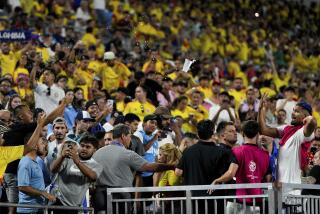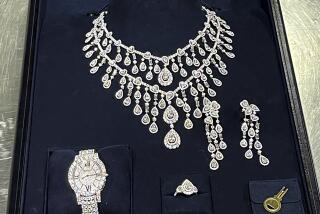Brazilian authorities ban caxirolas from World Cup stadiums
Remember the vuvuzela, the long plastic horn whose sound polluted both stadiums and television broadcasts during the 2010 World Cup in South Africa?
Of course you do. When 40,000 of them were played together, it sounded like a swarm of angry bees -- and, according to studies, it also had the potential to cause real harm to people’s eardrums.
Yet FIFA, the World Cup organizer, refused to ban them from the stadiums because the horns are a part of South Africa’s soccer culture in much the same way the wave is tolerated at sporting events in this country.
Now comes the caxirola, Brazil’s slightly quieter equivalent of the vuvuzela, which fans had planned to use at stadiums during this summer’s World Cup in Brazil. But this time local authorities have stepped in to ban the noisemaker from the tournament.
Federal officials said the ban was enacted for safety reasons, though caxirolas can still be played outside stadiums.
Invented by percussionist Carinhos Brown, a local cultural icon and Oscar nominee, the caxirola resembles a flat-bottomed avocado, according to the Wall Street Journal. It is made up of small plastic pieces that, when shaken, produce a loud jangle similar to a baby’s rattle. And for the World Cup, they’re being sold in the colors of the 32 participating teams.
“I was looking for a sacred instrument and almost every culture has one,” Brown told the Journal.
But last year, just as the instrument was beginning to catch on with soccer fans, the crowd at a game in Bahia pelted the field with caxirolas. Brazil’s Ministry of Justice quickly moved to block the noisemakers from last year’s Confederations Cup tournament. The ban was then extended to include the World Cup.
Brown, who said he wanted to design an instrument that was environmentally friendly and a symbol of Brazil’s Afro-Caribbean roots, told the Journal he is embarrassed and bemused by all the fuss over a plastic toy that sells locally for about $14.
“Maybe it’s not an instrument that’s good for the World Cup,” he told the newspaper.
More to Read
Go beyond the scoreboard
Get the latest on L.A.'s teams in the daily Sports Report newsletter.
You may occasionally receive promotional content from the Los Angeles Times.











